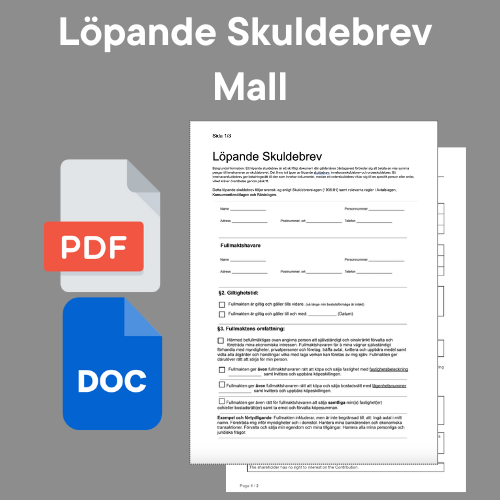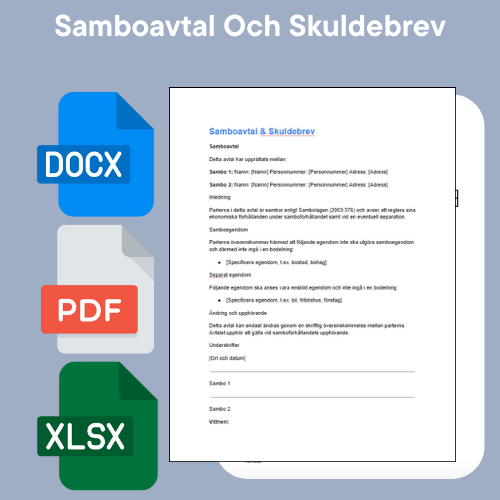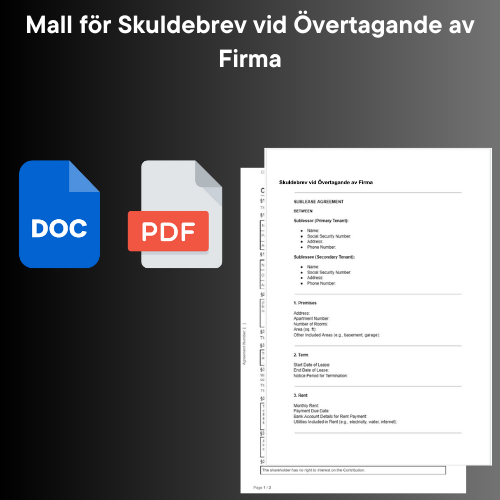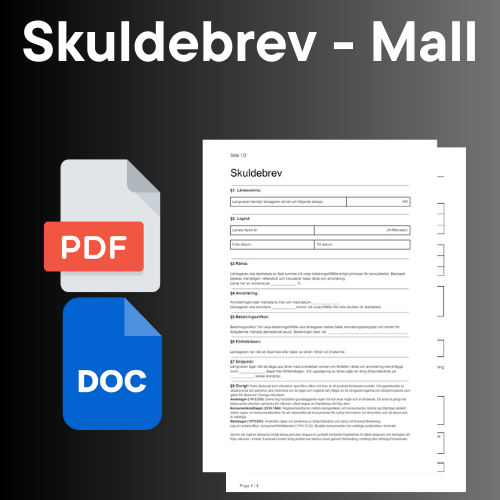When does a promissory note become invalid?
Share
When does a promissory note become invalid?
A promissory note is a legal document that constitutes evidence of a debt between two parties – the creditor (lender) and the debtor (borrower). For a promissory note to be valid, it must meet certain formal and substantive requirements according to Swedish law. But there are situations when a promissory note can become invalid. In this article, we will explore these situations and what it takes for a promissory note to remain valid.
Table of contents
- 1. Formal requirements for a promissory note
- 2. Prescription of promissory notes
- 3. Inaccuracies in the content of the promissory note
- 4. Agreement between spouses and cohabitants
- 5. Changes in the contractual relationship
- 6. Lack of evidence
- Summary
1. Formal requirements for a promissory note
For a promissory note to be valid under Swedish law, it must meet the following formal requirements:
- Written document: The promissory note must be in writing and clearly state the amount to be paid and the terms of payment.
- Signatures: The promissory note must be signed by both the creditor and the debtor. This confirms that both parties have accepted the terms.
- Unambiguity requirement: The content of the promissory note must be clear and not open to interpretation, to avoid disputes.
If these requirements are not met, the promissory note may lose its legal validity.
2. Prescription of promissory notes
A promissory note can also become invalid if it is time-barred. Prescription means that the right to demand payment ends after a certain time if no measures are taken to enforce the debt. According to the Swedish Limitation Act, the limitation period for debts is normally ten years, but for debts between traders and consumers the period is three years.
In order to avoid prescription, a so-called interruption of prescription must take place, which can be done by:
- That the debtor pays part of the debt.
- That the debtor acknowledges the debt in writing.
- That the creditor sends a written reminder or demand.
If no prescription break occurs within the set time, the promissory note loses its effect and can no longer be enforced in court.
3. Inaccuracies in the content of the promissory note
Inaccuracies in content can also render a promissory note invalid. If, for example, the amount stated in the promissory note is incorrect, if important information such as the due date is missing, or if the terms are unclear, the promissory note may be considered invalid. Furthermore, if the promissory note is drawn up under duress, fraud or if either party was not of sound mind at the time of signing, this may also invalidate the document.
4. Agreement between spouses and cohabitants
Special rules apply to promissory notes between spouses and cohabitants. A promissory note drawn up to regulate joint property or matrimonial property may be invalid if it is not accompanied by a cohabitation agreement or prenuptial agreement. This is because the law assumes that property is divided equally in the event of a separation or property division, unless otherwise agreed.
5. Changes in the contractual relationship
If the parties involved make changes to the debenture without these changes being properly documented, this may affect the validity of the debenture. It is important that all changes to, for example, payment terms or amounts are documented and approved by both parties.
6. Lack of evidence
A promissory note may lose its effect if it cannot be proven that the promissory note exists. This can happen if the original document is lost and no copy is available. Therefore, it is important to keep the promissory note in a safe place and to possibly consider having witnesses who can attest to the authenticity of the promissory note.
Summary
A promissory note is an important legal document that regulates a debt between two parties. To be valid, it must meet certain formal requirements, and it must be stored and handled properly. Invalidity can occur through prescription, content errors, improper agreements between spouses or cohabitants, or if the evidence surrounding the promissory note is lacking. By carefully following the requirements of the law, you can ensure that a promissory note remains valid and can be collected if necessary.




